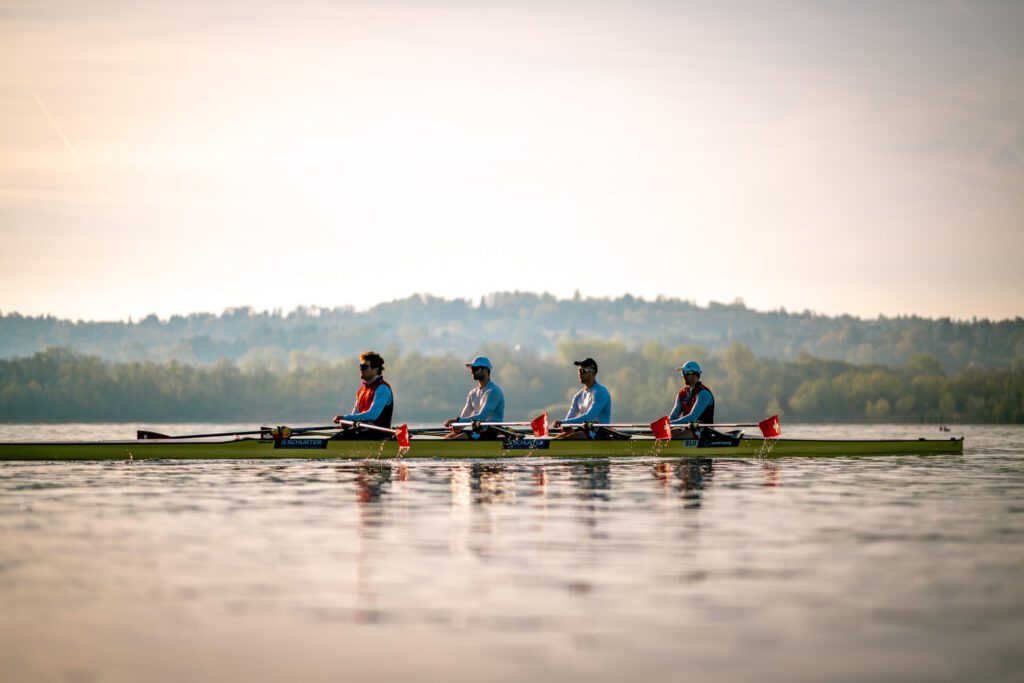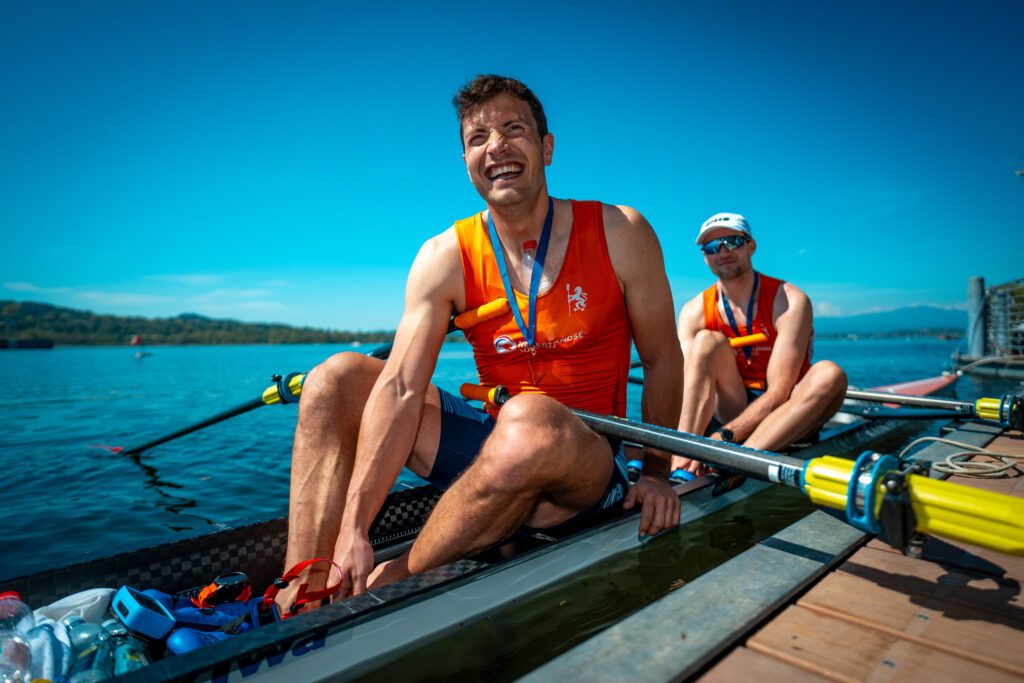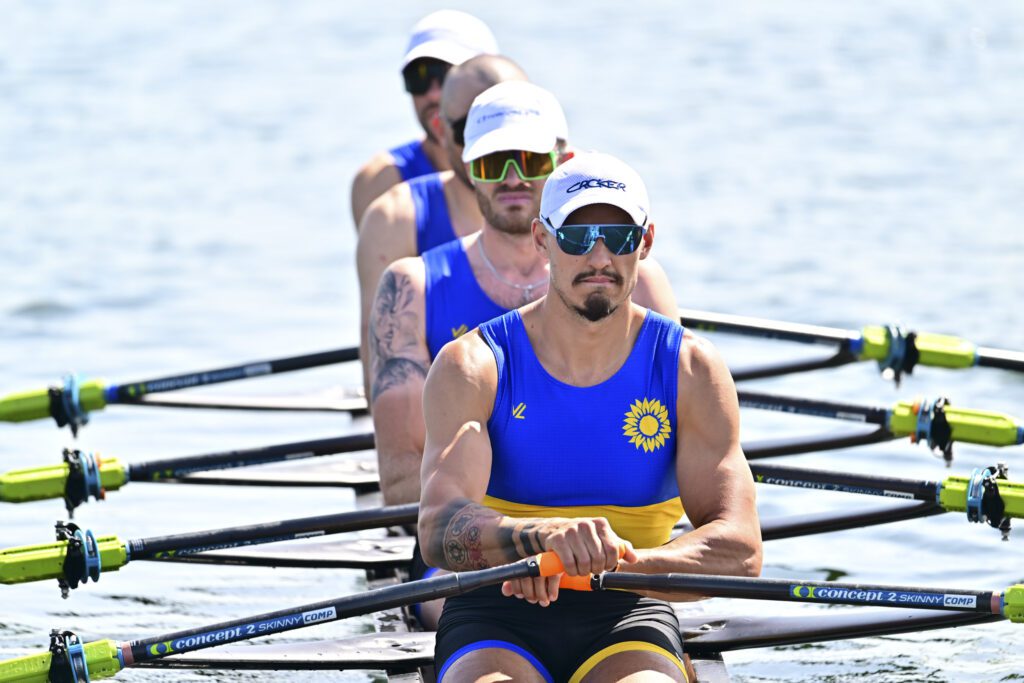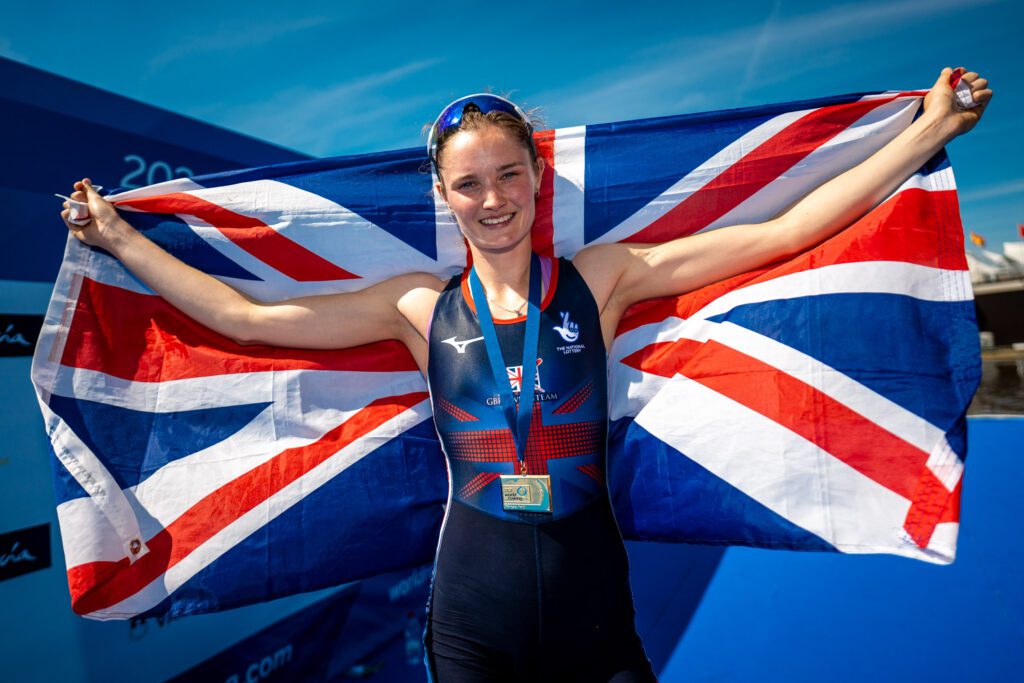Racice’s post-Covid celebration of rowing ended with a bang on Sunday as reputations were overturned and upheld, medal streaks chopped short and new stories started, all the verve of a new Olympiad combined with the knowledge that there are only 23 months to go until the start of Paris 2024. Dazzling races matched the sparkling sun which glinted off flat water and metal flagpoles on day eight of the first senior worlds for three interminable years.
After Saturday’s glamour of Great Britain coming back into the top end of the rowing scene, Sunday was all about heroics from the underestimated. An early credit should go to Romania, particularly star strokewoman Simona Radis who claimed a gold in the women’s double ahead of fierce competition from the Dutch duo, then joined them in the eights final, substituting for Denisa Tilvescu to take another gold an hour later. It’s ridiculously rare to win two world titles in a single racing session nowadays but even rarer to do it in two hard-fought Olympic class events sixty-five minutes apart, let alone subbing into the stroke seat. Flipping heck, Radis is hard as diamond. But more of that later.
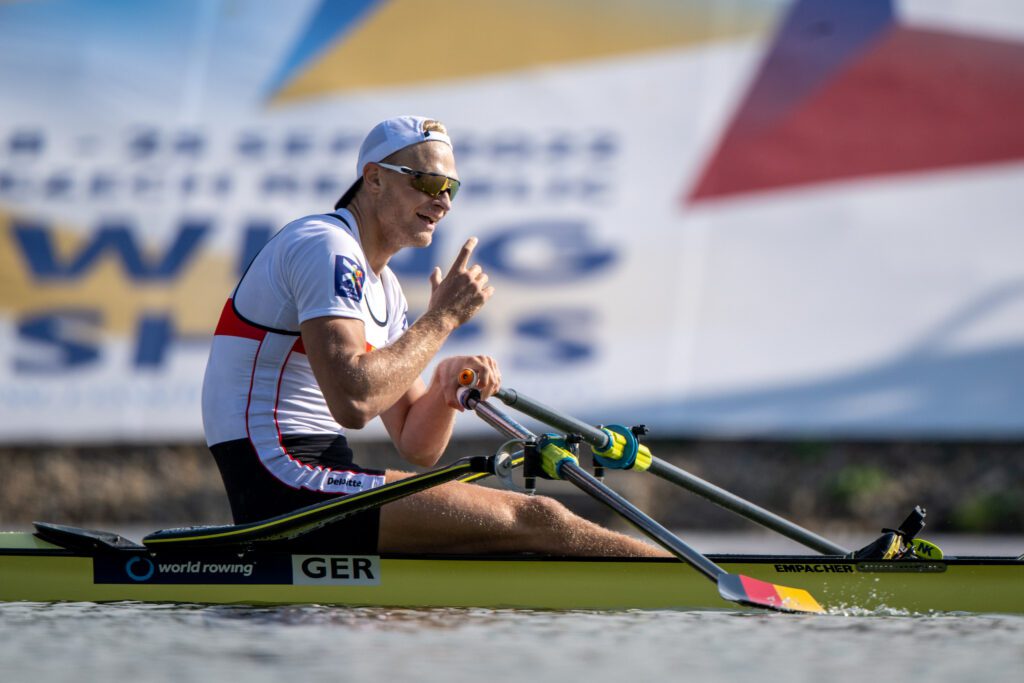
Photo GER M1x
Credit Benedict Tufnell
One of the most gritted-teeth races I’ve seen for years came from the men’s singles, in which 2019 champion Olli Zeidler slayed a million dragons of doubt with a surprise assault on rivals who must have started to take his lack of success for granted. After a week annoying his national federation by pointing out their inadequacies and difficulties all over the German press, Zeidler discombobulated those who wanted to take away his crown, particularly European champion Melvin Twellaar (NED) by seizing the initiative and refusing to let go of it. Surging away with what in 2019 we would have called his trademark start, he added some mid-race power and then a speedy finish sprint, blasting to bits any chance of second-placed Twellaar catching him. Meanwhile Briton Graeme Thomas turned in his own epic race, redlining it the whole way to stay as close as possible to Twellaar while simultaneously defending himself against repeated attacks from Kiwi Jordan Parry before denying the New Zealander bronze by a second.
“The magnitude of that race, the hardest race I’ve been involved in”, said Thomas. “Non-stop all the way to the line. Melvin and Olli are a cut above me but I tried to stay close. This was everything I had to offer today and I’m delighted it got me on the podium. I’d have bit anyone’s hand off at the start of the season who said I would be in this position.” Zeidler admitted that blowing up at Munich may have been due to not being frank enough to his team about illness and injury, but is clearly now being open with them, especially his father and coach Heino. “My father always played a big role in my preparation”, Zeidler said. “He always told me I could do it, that I was ready for this world championships even if I didn’t feel like that. This is a big win for him too. I’ve demonstrated that my father and I are doing great work in a non-national team training center.”
The masterstroke of the day came when France’s Olympic champions, Hugo Boucheron and Matthieu Androdias, completely turned the tables on Valent and Martin Sinkovic, the Croatians whom they had already taken to the cleaners once this week in the semi-final. The French soared to gold, never giving the brothers who won the Rio M2x gold a single moment’s look-in. Even the French were nearly closed down by the incredible sprinting ability of Spain’s Aleix Garcia Pujolar and Rodrigo Conde Romero who claimed a doughty silver having outwitted (and outrated) Australians Caleb Anthill and David Bartholot, leaving the Croatians clear-water back in fourth. “It’s a bit of a rebirth for us after a difficult year”, said Boucheron. “It was our only competition in the double this year, so it’s a bit of a surprise to get the gold, but the cohesion in the boat has been fantastic.” “We like to have contact with our rivals, so then we know the last 500m we get past them”, said Garcia Pujolar.
“The Spanish were too quick on the wind in, we got past them but then they did their signature step on”, said Anthill after Spain had whizzed up to 46 for the final 100 metres. “That’s pretty well up there with as much as we could have given it, so happy to come away with a bronze medal”, he added. “We’ve got to give a shout-out to the Croatians, they’ve been our idols for such a long time. It was awesome to race them and to come away with a win [against them] puts us in a pretty special group of rowers.” An extraordinary result, it was the first time the Sinkovics have ever been off the podium when racing as a duo.
Part one of the Romanian saga began early on, as the women’s doubles took to the water. Nobody really expected anyone other than the Dutch and Romanians to be contesting the gold, and to date the Dutch have never quite managed to trip up Romania’s star duo who first won together in 2019 and have barely put a foot wrong since, despite being by far the youngest in the field. Leading within thirty seconds Radis and Ancuta Bodnar kept their foot on the gas, whisking along at forty strokes a minute. In their considerable wake Irishwomen Sanita Puspure and Zoe Hyde from Ireland tried to duff up Lobnig sisters Magdalena and Katharina for third place, while Roos de Jong and Laila Youssifou kept themselves on track in second place while not wasting energy. The US and Germany left way behind, these eight scullers stuck their heads down and went, ramping the rate and power up and up. With one final stroke Bodnar celebrated her 24th birthday by crossing the line first, her present the gold medal she and her fellow Olympic champion only narrowly missed in 2019, with the Dutch second and the Irish outsculling Austria for bronze. “Very tight race, very good, all the way to the line”, said a surprised Hyde. “I thought we came fourth, it was just an amazing season. Sanita is a legend in the rowing community, I have been so glad to being able to race with her.””
Straight away it was time to worry about part two. The doubling-up of the teams had already been expected, the Dutch merging their four, pair and double to make an eight, while the Romanians already had their pair and four in the eight, but those were sweep finalists who had a whole day to recover. Denisa Tilvescu had been in the semifinal-winning Romanian W2- which finished a rather unexpected fourth the day before, and it emerged that Radis only learned early on Sunday morning that her team-mate was ill so she’d need to deputise — in the stroke seat of the eight.
While Laila Youssifou and Roos de Jong were ensconced on stationary bikes in the medallists’ zone waiting to collect their silvers, and avoiding interviews with a planned warm-down to get the lactate out of their legs, Radis — who turned 23 last April — merely wandered around while waiting for her first medal ceremony, idly chatting, then demonstrated she still had plenty of energy by jumping up and down when hers and Bodnar’s names were announced. Oh the sheer bounce of youth. An hour later she and the rest of the Romanians were sitting on the start of the eight’s race, tucked under the bank in lane one which they had been handed as a result of finishing fifth in the W8+ exhibition race several days earlier. For 240-odd strokes Radis and her crew simply turned the screw on the rest of the field, ditching exhibition race leaders the USA and Canada and moving gently away from the Dutch while Canada claimed the bronze. Gold number two, every single stroke of both races as hard as nails.
“The first gold was the one I most wanted, but the second one means much more”, said Radis, who has already won more metalware than most international rowers and with Bodnar has put together an unbeaten 18-race streak despite the pandemic. Every rower of the Dutch W8+ came away with two silver medals, the group having been runners-up in four different Olympic classes, while the Canadians coped with the pressure of having been Olympic champions by ignoring it to focus on the future. “It’s always a new story, and this story just started today, a few minutes ago in the lead-up to Paris 2024”, said cox Kristen Kit.
Earlier in the day another apparently unbeatable force was finally taken down in positive vortex of a race. The first was the opening medal contest of the day, pitting three regular rivals against a very fast newcomer in the PR1 men’s singles. Former world champion Erik Horrie (AUS), defending world and reigning Olympic champion Roman Polianskyi (UKR) and perennial bridesmaid Ben Pritchard (GBR) were facing the apparently inexorable speed of new European champion Giacomo Perini (ITA), a former equestrian who has been training as a serious rower for only a short time but has learned very fast. Determined not to be taken to the cleaners again as they had in Munich last month, Pritchard and Poliansky clung like burrs to Perini’s stern, the trio sweeping away into an uncatchable lead while Horrie, who initially managed to stay with them, could not live with the second-thousand pace and dropped back. Although Perini fought like a tiger, he could not prevent the hugely experienced Polianskyi from burning through him with sheer rate, and Pritchard from clinging closer to his coat-tails than the Briton has managed in World Rowing races this season, for bronze.
And so the three P’s took to the podium, the season’s form decidedly ruffled. “Good good race, Slava Ukraine”, said Polianskyi, who has been worrying about his country’s military problems all season. “It has been a great season but I was here to get the gold”, said Perini. “Now I accept the silver medal, it was a great race, but now I focus on next year.” “That’s the first medal since 2015 in the PR1 category for us, not quite the ultimate goal which is a gold but we’ll get there”, said Pritchard.
As the PR1 men returned from their medal ceremony Polianskyi was able to hug his young countrywoman, Anna Sheremet, who had just claimed her first PR1 worlds medal, a bronze behind Nathalie Benoit (FRA) and winner Birgit Skarstein (NOR). In some ways it was a predictable result, Skarstein on a 6-year, 27-race winning streak, but boy did she have to work for her gold medal this time, needing to slice her way laboriously through the field to take the lead from Benoit. “That was an incredible race, I knew they were going to start really hard”, said Skarstein of her competitors. “For me it was all about not losing track of them and then exploding myself, I’m getting older, I’m not quick at the start any more. It was so hard and so fun at the same time, I felt like they were breathing down my neck the whole time.”
Britain’s men crowned the nation’s most successful ever world championships with a glorious gold medal in their unbeaten eight, which felt perfectly normal but at the same time was the first world title for the British in this event for seven full years. Absent Germany, who were forced to finish their season languishing at the top of the B-final, the biggest challengers were Australia and the Netherlands, who went with them on every move, but couldn’t quite stop the GB mid-course surge. As heat winners Canada surprisingly fell back before half-way, a massive push from the Dutch was capped by the British power and a minute later the charge to the line began. All three leaders raised their game and finished in the same order they’d held for more than a kilometre: British gold, Dutch silver and Australian bronze.
“That was epic”, said British 7-man James Rudkin. “We probably got a head-start on everyone at the beginning of the year, and lots of people see what we’re doing and trying to catch up. But if you’re being chased you keep pushing. I think we knew that after Europeans, it’s not in the bag, and even this year we’ve got to keep driving.” “I was watching [the Dutch], the four seat was as close as they got really, and I knew we weren’t going to blow”, said cox Harry Brightmore. “I’m so proud of [my crew]”, said Dutch cox Diuwke Fetter. “[The group] can look a little chaotic maybe, but I think that works. No crabs, that’s what we always joke about since the Europeans, no crabs please.”
The women’s Olympic singles shed no huge surprises, Dutch sculler Karolien Florijn completing her unbeaten season with a commanding performance but pushed hard in the later stages by the mastery of grande dame Emma Twigg, returning to the water after Tokyo gold, a sizeable break from the sport, and adding a son to her family. Twigg was hounded all the way by the threat of Tara Rigney, the impressive Australian youngster who like Florijn has really found new life in a singles career, and Rigney in turn was attacked by China’s Lu Shiyu but saw her off to claim bronze behind the Kiwi and Dutchwoman. “I was just trying to hang on to [Twigg] and then saw the Chinese sculler coming in — I was glad I was only just ahead of her so was able to absorb the pushes”, said the Aussie. “I’ve enjoyed it so much. Last year was my first in seniors, but due to Covid I didn’t get the friendships you make along the way that I have this year. Alex Foester, Jeanine Gmelin, Karolien, I’ve had honestly so much fun.”
“I raced my best race and Karolien had a better one”, said Twigg. “That’s how the cookie crumbles”. She has not yet taken the decision of whether or not to return properly to the sport, and will compete at the coastal and beach sprints first before making her mind up, having planned this year of competition ‘for fun’. “I heard so much noise, it was amazing from the crowd”, said Florijn, who was cheered home by the entire Dutch men’s eight as they waited to collect their silver medals. “I could hear Ka-ro, Ka-ro. I’ve never raced Emma Twigg, I was pretty nervous but at the start I was so excited, so happy to be here and race all the best rowers.”
Stellar racing, great friendship on and off the water, and results to whet the appetite for the 24 months to come before both Games are complete. After all the restrictions this was normality back again with a roar, and thank heaven for it. A glorious end to a great year.
